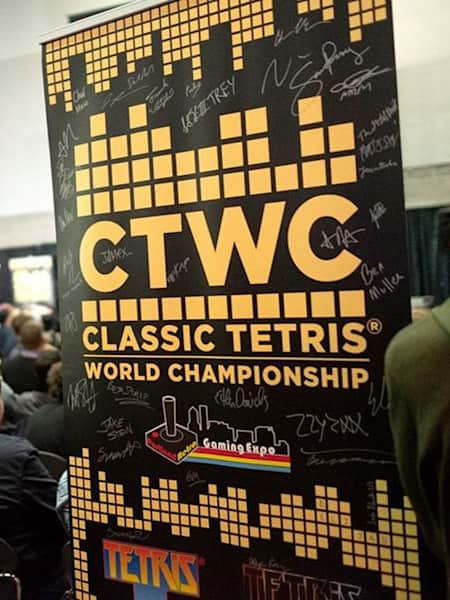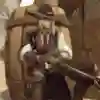Just like that, it's all over. A new champion is crowned, and for only the second time in nine years, Jonas Neubauer has failed to claim the title of greatest classic Tetris player in the world. It was a heated finale between Neubauer and Joseph Saelee, but in the end, the better player won.
This was the upset that capped off this year's iteration of the Classic Tetris World Championships. Having run for just under a decade, 2018's CTWC was the biggest and most competitive yet, not only attracting the highest standard of play the tournament had yet seen, but the most eyes, too – over 20,000 people watched the finals live on Twitch, that number ballooning to over 100,000 in the days after, viewership that dwarfs previous numbers. It's been a big year for the competition and a scene whose growth has surprised nobody more than its organisers.
Finding the best
“Probably around year four was, for me, when I was like 'Oh, we're just going to keep doing this,'” CTWC co-founder Vince Clemente recalled. “This was the ninth year, next year will be the tenth, I never imagined ten years after starting it that we would be here, still doing this.”
Clemente was charged with putting together the first tournament in 2010, as part of his role as a producer for Ecstasy of Order: The Tetris Masters, a documentary on the enduring following of the NES title. The plan then was to crown a best player in the world to make a compelling ending for the movie, but enthusiasm from players and the Tetris Company led to a 2011 follow-up, which led to a move in venue to the Portland Retro Gaming Expo for another in 2012 and what is now a staple of the Expo.
Over the years, expansion has been steady and organic, with satellite tournaments, qualifiers and other championships springing up all over the world. “Coming to this year, we had five qualifiers in the United States, the European championship is still going, there was a Finnish championship, there was a German championship,” Clemente said.
“There was a Hong Kong championship, and we had Jonas Neubauer, who's won our championship seven times, and Koji ‘Koryan’ Nishio, the greatest player in Japan, meet for an exhibition match in Hong Kong to get that tournament in Asia going.” The European side is overseen by Christofer Daniel, who joined Clemente in 2014 to help create a standardised global league for the game, with Trey Harrison, one of the subjects of Ecstasy of Order and a Tetris professional from the 1990s, filling out the ranks of the organisational higher ups. They make a strong team that understands why Tetris makes a great sport.
“A big part of it has to do with the speed of this particular version of Tetris,” Harrison says. “Ironically, it appears to be a little bit slower than some of the newer versions because you can't do what's called a 'hard drop,' where the piece instantly falls onto the stack, so I think it's easier as a spectator to watch and get a sense for when players are taking risks and when they're in danger.”
Their competition format helps too; ostensibly a game of two halves, one focused on strategy, the other survival. “The first half is played on level 18, which is a fraction of the speed of level 19. The first half is more strategic, trying to maximise the number of points you can get before you get to 130 lines,” Harrison explains. “And then the second half is more about surviving and getting as many points as you can. It's that high speed, that second half, that really starts to get people.”
A new generation
The version they use is the standard NTSC release, on a standard NES and controller. Having competed in the seminal Nintendo World Championships of the game in 1990, Harrison is an old-school member of the Tetris community, and helped run a site called TetrisMasters.com, a message board dedicated to puzzler. It was there that inaugural and multi-time champ, Neubauer, became involved. Over 10 years ago, Neubauer recorded himself completing a max-out game, where the score reaches the max number of 999,999, on VHS, sent it to Harrison who digitised it and uploaded it to TetrisMasters and then YouTube, through which Neubauer was contacted and asked to compete in the 2010 tournament. Back then, it was just high school kids and retro gamers trading scores and strategies, but now it's a legitimate international entity, something the advent of Twitch has had no small part in.
“Streaming has really allowed people to involve themselves in the community at a much more intimate level and get the information on what set-up they need to play the game properly,” Neubauer told me. “That's why I think the population of competitors has exploded, and just the appreciation of the game as well, because people can actually play it at home, right alongside us.”
Neubauer has been playing Tetris for almost 25 years, and has competed in all nine of the CTWC finals, only losing twice, in 2014 to Harry Hill and 2018 to teenage newcomer Joseph Saelee. His ability to remain calm under pressure has been key to his consistency, he says, while Harrison puts a lot of it down to his wilful slow playing, a play-style he's pioneered, where he lets the competitor get ahead of him and finish their game so he knows what score he has to beat. Either way, it's getting harder and harder to stay at the top.
“There are players that can tap the controller faster than I can hold it down,” Neubauer said. “It's a physical technique, it's going to change the way these tournaments are played in the future, it already has. I'm going to have to take my game to the next level. Honestly, it's tough at this point, but I still think there's room to go.”
Disappointing as it was, his 2014 loss was the shock to the system he needed. After winning four in a row, a sense of complacency was starting to set in. His practice regimen started only weeks before the tournament to shake off the cobwebs – 2014 was the least he'd practiced beforehand – an approach that just wouldn't cut it any more. Now, training is more long-term, trying out new techniques and massaging them into the fold.
“I started adding elements and aspects to my game that actually made me worse in the short-run, but now I've developed them and they're helping me out in these past three-four years,” he says. “It's kind of a front-brain, back-brain way to play that is super exhausting but adds a lot of potential to each game.”
Carrying the torch
Looking at this year, he needed it, as 2018 had an exponentially higher level of playing across the board. What had been one max-out during the qualifying rounds each year from 2014 through 2017 had become 11 in 2018, several players having more than one under their belt before reaching the knockout stages. Thanks to streaming and YouTube, prospective players have hours of footage to pore over if they're considering competing. A new level is reflected in the numbers: where 800,000 was once considered a home-run, now people are being eliminated despite getting over 900,000, 2018 seeing the highest scores across the board.
“There are no secret ways to play any more like there were in 2010,” Clemente says. “The play field is now very level, where there's probably eight-to-10 players who are at a similar level.”
Somehow this all bled into a bump in spectators no one is able to explain. Harrison recalls watching the viewer count on Twitch rise, slightly baffled, as famous author and vlogger John Green tweeted about it just as it was featured on the homepage of Twitch. Whatever the cause, they're thankful for this new wave of interest coming into 2019, the 10th tournament and the 35th anniversary of the game. The team want to further legitimise themselves as a global esport establishment, with one particular goal in mind.
“We saw that the 2024 Olympic committee said that they weren't opposed to video games, but they had to be non-violent. I think it's a no-brainer that Tetris should be in that first group of competitive esports gaming in the Olympics,” Clemente declared, with Harrison adding: “Yeah, if there's going to be video games in the Olympics, why not Tetris?”








